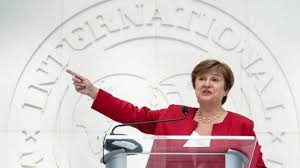International Monetary Fund has said to countries it assisted with emergency funding to tackle COVID-19 to spend but keep receipt of all expenditure because accountability can not take a back seat in this crisis.
IMF Managing Director Kristalina Georgieva said this at the opening plenary of the 19th International Anti-corruption Conference (IACC).
She said “in our emergency lending, we have provided financial lifelines to 78 countries. And we have sought to balance the need for accountability and transparency against the need to disburse financing very quickly – so doctors and nurses can be paid, and the most vulnerable people can be protected. Some of you may have heard me saying, spend what you need but keep the receipts. Accountability cannot take a back seat in this crisis.
What does that mean in practice?
First, all countries receiving emergency financing from the IMF must accept a safeguards assessment of the central bank. This is an IMF assessment of a central bank’s governance and control framework to ensure that it can manage IMF resources properly. Second, we have asked countries to commit to specific anti-corruption measures such as publishing crisis-related procurement contracts and information about the beneficial owners of winning companies. Third, countries must also commit to enhanced monitoring of COVID-related spending and to conduct an audit of crisis-related spending. This will be the moment to check the receipts.
For example, countries such as Guatemala, Honduras and Rwanda are using Financial Management Information Systems to track COVID-related expenditure. And in Sierra Leone, the Supreme Audit Institution is already undertaking an interim audit of COVID-19 funds. Fourth, in THE IMF’s regular policy consultations with all members—rich and poor—we are recommending that special attention be paid to transparency and accountability of exceptional measures undertaken during the crisis. We also disseminate good practice examples – so countries can learn from each other. This matters tremendously to everyone, but it is especially important to the most vulnerable people in societies. We know it is the poorest and most vulnerable people that are at highest risk from the pandemic and the economic consequences of the pandemic. And we know we know that among low-income countries, the share of the budget dedicated to education and health is one-third lower in highly corrupt countries. Corruption keeps children out of school, and it stops people who are sick getting the treatment they need.
“In the words of Pope Francis – “corruption is paid by the poor.”
So, our efforts to tackle corruption must continue over the long term – because fixing governance vulnerabilities requires time and perseverance.
At the Fund, much of our work on this issue is undertaken through our 2018 Framework for Enhanced Fund Engagement on Governance. And I want to pay tribute to Christine Lagarde for stepping up the Fund’s work in this area. We help our members strengthen anti-corruption efforts in six key areas – fiscal governance, financial sector oversight, central bank governance, market regulation, rule of law, and anti-money laundering.
We also look at transnational aspects through assessments of national frameworks to limit opportunities for corruption through foreign bribery or laundering of proceeds of corruption. Ten countries – the G7 plus Austria, Czech Republic, and Switzerland – have volunteered so far and we urge others to join this important initiative. And in our work on data transparency we urge citizens to keep track of how public money – their money – is spent. Civil society has an incredibly important role to play in this work, including by helping us all to do better. And we are very grateful for that”.

